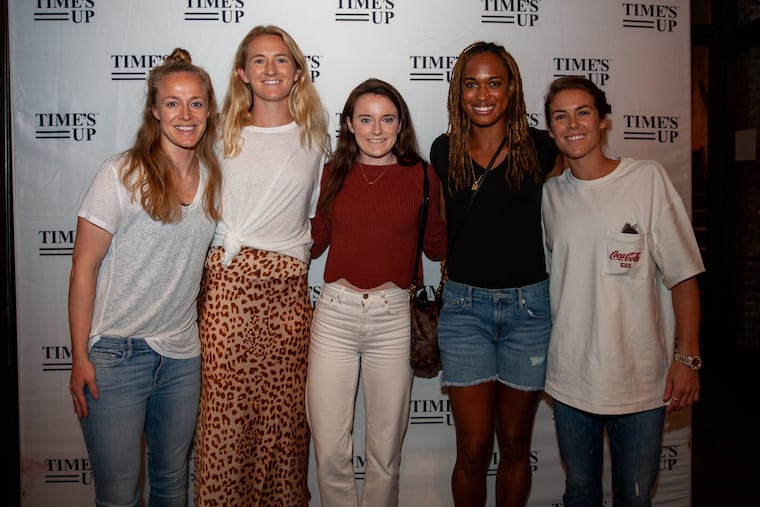Rose Lavelle leads U.S. women’s soccer’s new generation of stars into activism
While in Philadelphia, players met with Mayor Kenney and Time’s Up, the advocacy organization fighting sexual assault, harassment and inequality in the workplace.

If you would prefer to keep sports and politics separate, you probably figured out long ago that the U.S. women’s soccer team would like you to not.
So it’s no surprise that, while in Philadelphia, some players from the back-to-back World Cup winners met on Tuesday with representatives of Time’s Up, an advocacy organization fighting sexual assault, harassment and inequality in the workplace.
The gathering also included Mayor Kenney, well-known for his soccer fandom and his signing of a wage equity law for the city in 2017. A day later, he was at Lincoln Financial Field for the U.S. team’s open practice.
The U.S. women’s team’s players union and Time’s Up have been working together for a few months, at the same time that the players are suing the U.S. Soccer Federation for gender discrimination. Thursday’s game against Portugal at the Linc, which will draw the largest crowd for a standalone U.S. women’s friendly in team history, is the first since the presiding judge scheduled the trial for next May, earlier than both sides had suggested.
“These women came home from the World Cup, and something in America changed because people got in their gut, not necessarily for the first time, but a really distinct way, inequity,” Time’s Up chief policy officer Jen Klein said. “Because of how good they are, they’ve moved this country. And I think — it sounds silly to say, but it’s really true — for all these little girls, or teenagers, or young women in college or playing soccer, you see role models. You see if somebody can do this, you could do this.”
U.S. veterans Becky Sauerbrunn, Alex Morgan and, of course, Megan Rapinoe are well-known for their social stands. But the activism streak runs through the team’s newer players, too. World Cup debutants Rose Lavelle, 24, and Samantha Mewis, 26, were at the Time’s Up event. So was Jessica McDonald, 31, the World Cup team’s only mother and one of five black players on the squad.
“For as much as I’ve learned from my teammates on the field, I feel like I’ve learned even more from them off the field,” said Lavelle, a Cincinnati native whose title-clinching goal in the World Cup final vaulted her to global superstardom.
“It’s an opportunity to make a statement for women everywhere and help push the needle,” she said. “I want to learn more, and I think there’s something really empowering and inspiring about being in a room with a ton of people who are all working towards equality for women. I’ve loved meeting and learning from so many different people.”
The team’s diversity resonates with Klein just as much as its success. The 23 World Cup players represented a range of races and sexual orientations and hailed from fourteen states across the country. Seven more are home to players’ club teams.
As Megan Rapinoe famously said at the Americans’ World Cup parade in New York last month, “We have pink hair and purple hair. We have tattoos and dreadlocks. We’ve got white girls and black girls and everything in between. Straight girls and gay girls, hey!”
And Rapinoe isn’t the only one who is unafraid to say it.
“They not only are diverse but talk about their diversity and talk about how important all of these different pieces of their own identity are important to them,” Klein said. “It just reinforces [to the public] that, you know, I can see myself in them.”
The impact of the work done by Time’s Up is in turn getting through to the team. U.S. women’s players union executive director Becca Roux praised Lavelle and her teammates for their engagement.
“Time’s Up has opened my eyes [and] our players’ eyes to say, ‘You’re not alone in this,' " Roux said. “[Lavelle] could spend her time any way she wants, but she’s showing up to this. To watch some of the younger players be like, ‘Hey, I want to learn more about this. I want to grow into this.’ … It’s been really fun to watch some of them dive in.”
Roux didn’t want to point at individual power-brokers in the U.S. Soccer Federation, especially given the current state of the lawsuit. But it’s a matter of public record that three of the four highest-ranking U.S. Soccer executives are men who have been criticized for how the governing body is run: president Carlos Cordeiro, CEO Dan Flynn and chief commercial officer Jay Berhalter.
The highest-ranking woman in the organization, vice president Cindy Parlow Cone, a former national team player, was elected to that job in February. Cordeiro held the role until he was elected president in February 2018; the job was vacant until Cone’s arrival.
“For U.S. Soccer and for any institution to eradicate any systemic discrimination that might be happening, intentional or not intentional, they have to first be willing to look at themselves and say, ‘What is equality? Do we have a gap, and how do we close it?’ ” Roux said. “If people and leaders and various institutions, including U.S. Soccer, aren’t doing that, it’s going to be harder to get to a place where there’s a resolution, [and] not only for us.”